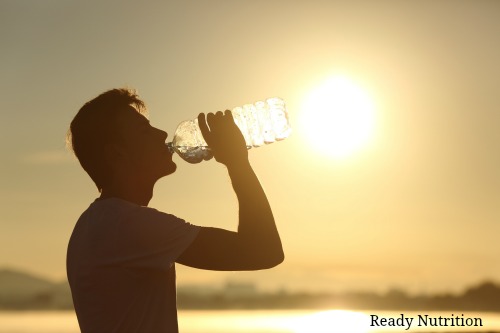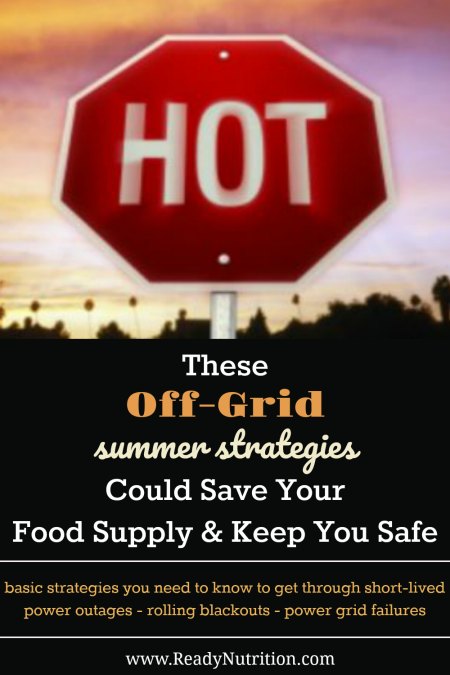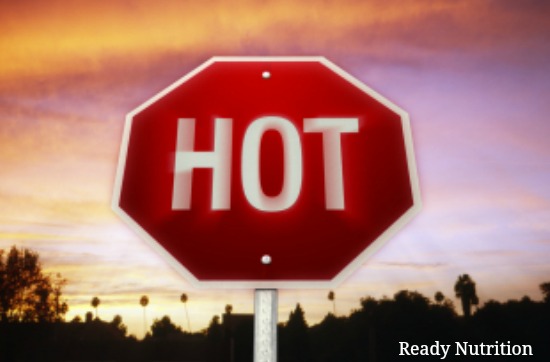In the coming months, the power grid will be pushed to extremes and can force homes off the grid if temperatures reach maximum digits. Or, in some cases, the electrical companies must turn the power off during extreme weather events like wildfires or rolling blackouts. Whatever the case may be, this creates an issue for those who have health issues, want to protect their perishable food supply, or avoid the frenzy at the stores for those scrambling to get supplies. Here are some informative tips on how to better prepare beforehand and how to minimize health-related issues from heat.
In the event of a grid failure, would you be prepared?
Preparing does not have to be costly or difficult. In most cases, all you need to concentrate on is maintaining your basic needs. In fact, there are many ways of living out a short-term disaster with minimal inconvenience. However, there are some situations that need to be accounted for that require some resourcefulness. Consider reading The Prepper’s Blueprint for more concise instructions and a detailed guide to preparing for the worst. Keep in mind the needs of the elderly and young children, and pets.
1. Store extra water

When the power goes out, municipal water treatment facilities run on electricity to pump the water and may not be functioning fully. Therefore, after a given period of time, tap water may not be safe water for drinking, cooking, and personal hygiene. While your state, local, or tribal health department will keep you updated and make specific recommendations for boiling or treating water in your area, having water stored ahead of time can circumvent this situation.
If we go by the suggestion from emergency organizations and have 1-gallon per person per day, a family of 5 will need 35 gallons of water per week. Can you imagine getting that amount at a grocery store during a disaster event? The easiest way is to pick up a few gallons each grocery store trip and stash them away. Moreover, give those one-time water bottles an extra use! Once the water in the bottles has been consumed, wash them out and fill them with water to be placed in the freezer. In an off-grid event, the frozen water bottles will keep food cold and when it thaws, you can drink the water. You can read more about water storage strategies to get more ideas.
On a side note, certain medication needs refrigeration to keep their strength. Having an off the grid compliant refrigerator dedicated to emergency medical needs could be helpful in your preparations. As well, freezing zip-loc bags of water could also assist in maintaining the integrity of these medications. Contact your doctor ahead of time to get further information for medication when the power goes out. The CDC recommends:
- When the power is out for a day or more, throw away any medication that should be refrigerated, unless the drug’s label says otherwise.
- If a life depends on the refrigerated drug, but the medications have been at room temperature, use them only until a new supply is available.
- Replace all refrigerated drugs as soon as possible.
2. Protect your food sources

For these types of disasters, it is interesting to keep in mind the season, and the geographic locale where you reside with regards to your food supply and food shopping. Being that you are prepping for a summer event, you do not want to buy extra perishable foods that could spoil if you are off the grid longer than 24 hours. Instead, one off-grid strategy to note is to start depleting your freezer during the hot summer months before a disaster is imminent. The reason being is if you can keep your freezer almost empty and the refrigerator with about 2 to 3 days of food for the family your entire food supply is not completely lost if a disaster occurs. Read further about protecting your perishable food supply when the power goes out.
For the time being, you can concentrate on placing your food dollars into canned goods or long-life, shelf-stable meals, dried goods, and other foods that will be able to withstand the weather and are sealed up tight. This article has some great menu suggestions to get ideas that would only require extra water to prepare.
While most of your perishable food supply will keep for at least 24 more hours in the refrigerator, as a prepper you should be prepared to do what you can to save it. Start learning ways of preserving food: salt it, can it, smoke it, or dry it out.
3. Stock up on batteries

Stocking up on batteries is a no-brainer for emergency preparedness supplies, but have you considered the importance of batteries for devices that rely on electricity to keep you alive? Let’s take oxygen therapy that relies on machines, for example.
According to this website, “those who use portable oxygen concentrators will have to ensure that they have enough power to run their machines until they can recharge any empty batteries. You should always have a fully charged battery on hand to rotate out with your regular battery, but you should also keep additional batteries in storage.
However, storing lithium batteries for the long-term must be done carefully. To ensure that your battery doesn’t lose its capacity, you should store your batteries, ideally, at a 40% charge around 60°F. You can also rotate all your extra batteries to make sure that there is at least one that is fully charged and not in use.”
…
In the event of an emergency in which power is precious, you may be able to reduce your oxygen intake to save your battery. Speak with your doctor to see if you would be able to lower your oxygen flow rate or dosage in the event of an emergency but remember only to do so if the doctor gives his or her explicit approval!
Battery-operated items can be a welcome friend in an off-grid summer event but there are many different batteries to keep in mind for different jobs. While having the easy-to-find batteries for replacing in flashlights and small accessories, you will also want extra batteries for larger items. Consider investing in a portable generator that can be charged from your car or with solar power. Here are some other preparedness items to keep in mind:
4. Monitor your health

Heat-related deaths are the top weather-related killer in the United States with heatstroke being the most serious heat illness. It happens when the body can’t control its own temperature and its temperature rises rapidly. Sweating fails and the body cannot cool down. Body temperature may rise to 106°F or higher within 10 to 15 minutes. Heatstroke can cause death or permanent disability if emergency care is not given.
Be aware of yours and others’ risk for heat-related medical issues such as stroke, heat exhaustion, heat cramps, and fainting. Although anyone at any time can suffer from heat-related illness, some people are at greater risk than others.
- Infants and young children are sensitive to the effects of high temperatures and rely on others to regulate their environments and provide adequate liquids.
- People 65 years of age or older may not compensate for heat stress efficiently and are less likely to sense and respond to change in temperature.
- People who are overweight may be prone to heat sickness because of their tendency to retain more body heat.
- People who are prone to overexertion during work or exercise may become dehydrated and susceptible to heat sickness.
- People who are physically ill, especially with heart disease or high blood pressure, or who take certain medications, such as for depression, insomnia, or poor circulation, may be affected by extreme heat.
- Visit adults at risk at least twice a day and closely watch them for signs of heat exhaustion or heat stroke. Infants and young children, of course, need much more frequent watching.
Remember to keep cool and use common sense:
- Close the curtains and window blinds in the home to keep the home cooler.
- Drink plenty of fluids and replace salts and minerals in your body. Do not take salt tablets unless under medical supervision.
- Dress infants and children in cool, loose clothing and shade their heads and faces with hats or an umbrella.
- Limit sun exposure during mid-day hours and in places of potential severe exposure such as beaches.
- Do not leave infants, children, or pets in a parked car.
- Provide plenty of freshwater for your pets, and leave the water in a shady area.
Keeping these considerations in mind will help make you more resilient to the lasting effects of power outages over the coming months.

This article was originally published at Ready Nutrition™ on June 9th, 2019








Great article. Thanks.
shutting down the electricity after the fire has started seem a little stupid
It’s normally when the wildfire breaks out they will cut the power to the surrounding area so that it doesn’t exacerbate the fire further.
if you are a fireman and hit a hot wire you will be electrocuted and it will hurt like hell the whole time you are burning and dieing please throw the breaker dont try putting out a fire with an extinguisher either ditto
Consider camouflage netting (white or sky blue), strung from the roof of your house, as an off-grid replacement for air conditioning. Or plant shade trees around your house.
Plant vines to shade the south and west side of your house. Buy the mylar survival blankets and clip behind the curtains to block the sun/heat from the room